初中英语作文-幸运数字 Lucky Numbers
中考英语优秀作文LuckyNumbers

中考英语优秀作文LuckyNumbers中考英语优秀作文范文 Lucky NumbersLucky Numbers最近几年,一直流行幸运花、幸运石、幸运数字等说法,即有些东西与人的命运联系在一起,如果掌握住了,就会使自己生活幸福,你对这种现象有何看法?要求:①题目:自拟。
②叙述要有条理,观点明确,翻译题目提示不得分。
③词数120词左右。
The lucky-number has become increasingly popular in daily life of mordern socialty. For example, the number eight means big money which people like most, while the number four means death.Some people believe lucky numbers so deeply that they will afford a telephone with numbers without four and others which is bad in their mind. They argue that the lucky-number really can bring good luck, and, at least, no evidence testify they can not.As far as I am concerned, there is no such relationship betwwen the numbers and lucky, for the reason that numbers theirself are given certain meaning for the purpose of application of mathmetic. And, In addition, man should not depend on lucky which, in their mind, the numbers gives them.。
幸运数字相关英语作文

幸运数字相关英语作文Title: The Significance of Lucky Numbers。
In various cultures around the world, the concept of lucky numbers holds significant importance. These numbers are believed to bring good fortune, success, and happinessto individuals who associate with them. From ancient timesto the modern era, the belief in lucky numbers persists and influences various aspects of people's lives.First and foremost, let's delve into the origins of the belief in lucky numbers. The fascination with certain numbers can be traced back to ancient civilizations such as the Chinese, Egyptians, Greeks, and Romans. These cultures attributed mystical properties to specific numbers, associating them with divine significance or cosmic harmony. For example, in Chinese culture, the number eight is considered extremely lucky due to its phonetic similarityto the word for "wealth" or "prosper." Similarly, the number seven holds profound importance in many cultures dueto its association with spirituality and perfection.Furthermore, lucky numbers often play a crucial role in various rituals, traditions, and superstitions. In many societies, individuals choose specific numbers for important events such as weddings, business ventures, or even buying a house. It is not uncommon for people to go to great lengths to incorporate their lucky numbers into their lives, such as selecting phone numbers, license plates, or addresses that contain them. This practice stems from the belief that surrounding oneself with auspicious numberswill attract positive energy and ward off misfortune.Moreover, the influence of lucky numbers extends beyond personal beliefs and customs into popular culture and entertainment. In the realm of gambling, for instance, certain numbers are considered luckier than others, leading players to bet on them in the hopes of winning big. Additionally, in the world of sports, athletes oftenexhibit superstitions related to numbers, wearing jerseys with specific numbers they believe will bring them luck on the field or court.However, it's essential to acknowledge that the belief in lucky numbers is not solely based on superstition but also psychological factors. Psychologists suggest that the power of lucky numbers lies in the placebo effect, where individuals' belief in the positive outcome associated with these numbers can influence their behavior and attitude, ultimately leading to favorable results. In this sense, lucky numbers serve as psychological anchors that instill confidence and optimism in individuals, enabling them to navigate life's challenges with a sense of empowerment.Furthermore, the significance of lucky numbers transcends cultural boundaries and resonates with people from diverse backgrounds. In an increasingly interconnected world, where cultures intersect and blend, the belief in lucky numbers serves as a unifying force that bridges differences and fosters a sense of shared humanity. Regardless of one's nationality, religion, or upbringing, the allure of lucky numbers speaks to the universal desire for hope, fortune, and happiness.In conclusion, the concept of lucky numbers permeates various aspects of human existence, from ancient beliefs and cultural traditions to contemporary practices and psychological phenomena. Whether rooted in superstition, tradition, or psychology, these numbers hold profound significance for individuals seeking guidance, protection, and prosperity in their lives. As we continue to navigate the complexities of the modern world, the enduring appeal of lucky numbers reminds us of the timeless quest for meaning and fulfillment that unites us all.。
luck numbers英语作文

luck numbers英语作文English Answer:Luck numbers are those that are believed to bring good fortune or luck. They are often associated with certain cultures, traditions, or beliefs. For example, in Chinese culture, the number 8 is considered lucky because it sounds like the word for "prosper" or "wealth." In Western cultures, the number 7 is often seen as lucky, while the number 13 is often associated with bad luck. While there is no scientific evidence to support the idea that certain numbers are lucky, many people believe that they can influence their luck or destiny.Some people believe that luck numbers can be used to attract good fortune or ward off bad luck. For example, someone who believes that the number 7 is lucky might wear a necklace with a number 7 pendant or live in a house with the address number 7. Others believe that luck numbers can be used to predict the future. For example, someone whobelieves that the number 13 is unlucky might avoid making important decisions on the 13th of the month.Ultimately, whether or not you believe in luck numbers is a personal choice. There is no right or wrong answer. However, if you do believe in luck numbers, it can be a fun and harmless way to add a little bit of extra luck to your life.Some of the most common luck numbers include:7 This number is considered lucky in many cultures, including Western and Eastern cultures. It is often associated with good fortune, prosperity, and completeness.8 This number is considered lucky in Chinese culture because it sounds like the word for "prosper" or "wealth." It is often used in Chinese restaurants and businesses to attract good fortune.9 This number is considered lucky in many cultures because it is the highest single-digit number. It is oftenassociated with completion, success, and longevity.13 This number is often associated with bad luck in Western cultures. However, it is considered lucky in some other cultures, such as Chinese culture.21 This number is considered lucky in many cultures because it is the sum of two lucky numbers, 7 and 14. It is often associated with good fortune, prosperity, and happiness.中文回答:幸运数字是人们相信能够带来好运或运气的数字。
幸运数字是否真的和幸运有关英语作文

幸运数字是否真的和幸运有关英语作文Are lucky numbers really connected to luck?IntroductionLucky numbers have been a part of different cultures and traditions for centuries. People believe that certain numbers bring good fortune, while others bring bad luck. But is there any real connection between numbers and luck? In this essay, we will analyze different perspectives on the topic to determine whether lucky numbers are truly related to luck.Historical beliefsThroughout history, many civilizations have had beliefs about the influence of numbers on luck. In Chinese culture, the number 8 is considered extremely lucky because it sounds like the word for prosperity. Similarly, in Western cultures, the number 7 is often considered lucky due to its significance in religious texts and mythology.Superstitions and rituals surrounding lucky numbers have also been prevalent in many societies. People often choose to play certain numbers in lotteries or at casinos based on personal beliefs about their luck. This practice highlights the psychological impact of lucky numbers on human behavior.Scientific perspectiveFrom a scientific standpoint, there is no statistical evidence to support the idea that certain numbers bring good or bad luck. Random events, such as winning a lottery or rolling a dice, are not affected by the numbers chosen. The concept of lucky numbers is primarily a product of human cognition and cultural beliefs.Psychologists have studied the phenomenon of lucky numbers and found that people tend to attribute significance to certain numbers based on personal experiences or social influences. This psychological bias can lead individuals to perceive patterns where none exist, leading them to believe in the power of lucky numbers.ConclusionIn conclusion, while lucky numbers have been a significant part of human culture and beliefs, there is no empirical evidence to support the idea that numbers have any inherent connection to luck. The belief in lucky numbers is primarily a cultural phenomenon that reflects human cognitive biases and psychological tendencies.Ultimately, whether we believe in lucky numbers or not, it is important to remember that luck is a complex and unpredictable concept that cannot be controlled by numbers or superstitions. Instead of relying on lucky numbers, we should focus on making our own luck through hard work, perseverance, and positive thinking.。
幸运数字相关英语作文
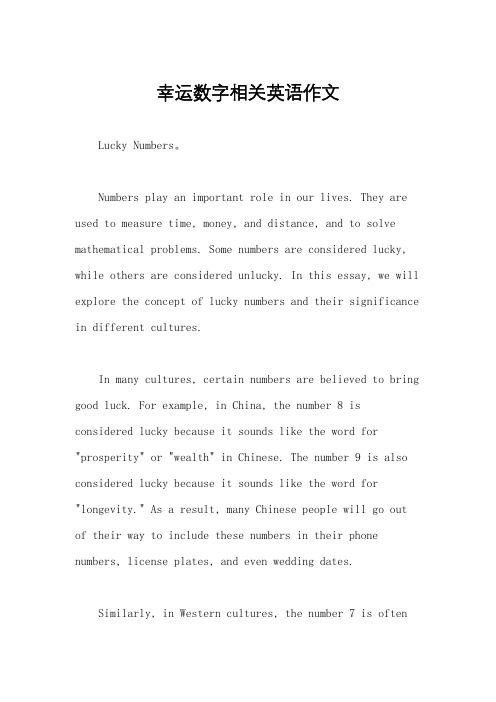
幸运数字相关英语作文Lucky Numbers。
Numbers play an important role in our lives. They are used to measure time, money, and distance, and to solve mathematical problems. Some numbers are considered lucky, while others are considered unlucky. In this essay, we will explore the concept of lucky numbers and their significance in different cultures.In many cultures, certain numbers are believed to bring good luck. For example, in China, the number 8 is considered lucky because it sounds like the word for "prosperity" or "wealth" in Chinese. The number 9 is also considered lucky because it sounds like the word for "longevity." As a result, many Chinese people will go out of their way to include these numbers in their phone numbers, license plates, and even wedding dates.Similarly, in Western cultures, the number 7 is oftenconsidered lucky. This may be because of its significancein religion and mythology. In the Bible, God created the world in seven days, and there are seven deadly sins. In mythology, there are seven wonders of the world and seven planets in the solar system. As a result, many people believe that the number 7 brings good fortune and will use it in games of chance, such as the lottery or roulette.However, not all cultures have the same lucky numbers. In Japan, for example, the number 4 is considered unlucky because it sounds like the word for "death" in Japanese. As a result, many buildings in Japan do not have a fourth floor, and some hospitals and hotels do not have room numbers that include the number 4.In some cultures, numbers are also associated with certain colors, animals, or elements. In Chinese astrology, for example, each year is associated with a different animal and element. People born in the year of the dragon, for example, are believed to be lucky because the dragon is associated with the element of water, which is believed to bring prosperity and good fortune.In conclusion, lucky numbers are a fascinating aspect of different cultures around the world. While some numbers are considered lucky in one culture, they may be considered unlucky in another. Regardless of their cultural significance, numbers continue to play an important role in our lives, and we often use them to make decisions and solve problems. Whether we believe in lucky numbers or not, they are a reminder of the rich and diverse traditions that make our world a more interesting and colorful place.。
幸运数字的英语作文
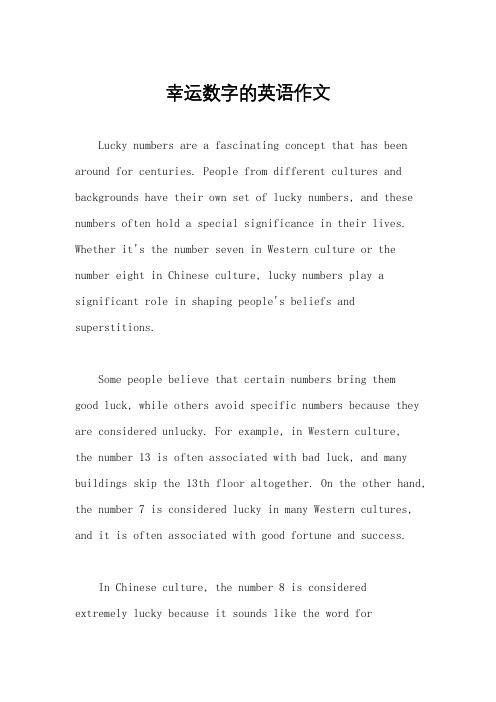
幸运数字的英语作文Lucky numbers are a fascinating concept that has been around for centuries. People from different cultures and backgrounds have their own set of lucky numbers, and these numbers often hold a special significance in their lives. Whether it's the number seven in Western culture or the number eight in Chinese culture, lucky numbers play a significant role in shaping people's beliefs and superstitions.Some people believe that certain numbers bring themgood luck, while others avoid specific numbers because they are considered unlucky. For example, in Western culture,the number 13 is often associated with bad luck, and many buildings skip the 13th floor altogether. On the other hand, the number 7 is considered lucky in many Western cultures, and it is often associated with good fortune and success.In Chinese culture, the number 8 is consideredextremely lucky because it sounds like the word for"wealth" and "prosper" in Chinese. As a result, many people in China and other East Asian countries consider the number 8 to be extremely auspicious, and they often go to great lengths to incorporate this number into their lives.In addition to cultural significance, lucky numbers also play a role in everyday life. Many people choose to incorporate their lucky numbers into important decisions, such as choosing a wedding date or buying a lottery ticket. Whether it's a personal belief or a cultural tradition, lucky numbers continue to hold a special place in people's hearts and minds.In conclusion, lucky numbers are a fascinating aspect of human culture that has been around for centuries. Whether it's the number 7 in Western culture or the number 8 in Chinese culture, lucky numbers hold a special significance in people's lives. Whether it's a personal belief or a cultural tradition, lucky numbers continue to play a significant role in shaping people's beliefs and superstitions.。
幸运数字英语作文

幸运数字英语作文Title: The Significance of Lucky Numbers。
Lucky numbers have always held a special place in cultures worldwide. From personal superstitions to cultural traditions, these numbers carry a significance that often transcends mere numerical value. Exploring the concept of lucky numbers reveals insights into human psychology, cultural diversity, and the intricacies of belief systems.First and foremost, it's essential to understand what constitutes a lucky number. While specific numbers may be deemed lucky in one culture, they could be considered unlucky in another. For example, the number 7 is widely regarded as lucky in Western cultures due to itsassociation with good fortune and spirituality. In contrast, the number 8 holds significant importance in Chinese culture, symbolizing prosperity and success. These cultural variations highlight the subjective nature of luck and its connection to societal norms and values.One of the most intriguing aspects of lucky numbers is their influence on human behavior. Many people incorporate their lucky numbers into various aspects of their lives, from choosing lottery numbers to selecting wedding dates. This behavior reflects a deep-seated belief in the power of these numbers to influence outcomes and shape destiny. Psychologically, the belief in lucky numbers can provide a sense of comfort and control in an unpredictable world, offering a tangible symbol of hope and positivity.Moreover, the significance of lucky numbers extends beyond individual beliefs to impact broader societal practices. In some cultures, certain numbers are avoided altogether due to their association with bad luck or misfortune. For example, the number 13 is often considered unlucky in Western societies, leading to the omission of13th floors in buildings and the avoidance of scheduling events on the 13th day of the month. These collective superstitions demonstrate the pervasive influence of lucky numbers on cultural norms and rituals.Interestingly, the concept of lucky numbers has also found its way into various fields beyond superstition and folklore. In mathematics, certain numbers possess unique properties that make them particularly fascinating to mathematicians and researchers. For instance, prime numbers, which can only be divided by themselves and 1, haveintrigued mathematicians for centuries due to their mysterious and elusive nature. While not traditionally associated with luck, these numbers symbolize the beautyand complexity of mathematics, illustrating how numerical concepts can transcend cultural boundaries.In conclusion, lucky numbers serve as more than just arbitrary digits—they represent a fascinating intersection of psychology, culture, and mathematics. Whether deeply ingrained in personal beliefs or woven into the fabric of societal norms, these numbers hold a symbolic significance that resonates across diverse cultures and contexts. By exploring the meaning and impact of lucky numbers, we gain valuable insights into the human psyche and the intricate ways in which beliefs shape our perceptions of luck and destiny.。
幸运数字英文作文
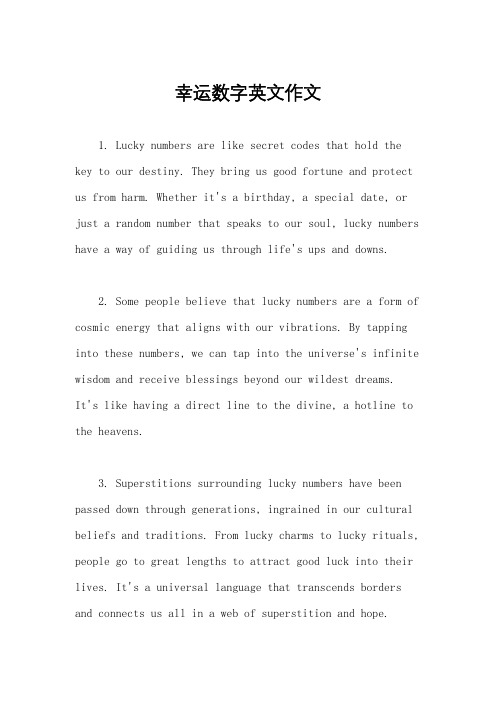
幸运数字英文作文1. Lucky numbers are like secret codes that hold the key to our destiny. They bring us good fortune and protect us from harm. Whether it's a birthday, a special date, or just a random number that speaks to our soul, lucky numbers have a way of guiding us through life's ups and downs.2. Some people believe that lucky numbers are a form of cosmic energy that aligns with our vibrations. By tapping into these numbers, we can tap into the universe's infinite wisdom and receive blessings beyond our wildest dreams.It's like having a direct line to the divine, a hotline to the heavens.3. Superstitions surrounding lucky numbers have been passed down through generations, ingrained in our cultural beliefs and traditions. From lucky charms to lucky rituals, people go to great lengths to attract good luck into their lives. It's a universal language that transcends borders and connects us all in a web of superstition and hope.4. In a world filled with uncertainty and chaos, lucky numbers offer a sense of comfort and stability. They provide a sense of control in a world that often feels out of our hands. Whether it's a lucky lottery ticket or a lucky number plate, we cling to these numbers like a lifeline, hoping that they will lead us to a brighter tomorrow.5. The power of lucky numbers lies not in their numerical value, but in the belief and faith we place in them. They serve as a reminder that there is magic in the world, that miracles can happen if we just believe. So, next time you see a number that speaks to your soul, embrace it with open arms and let it guide you on your journey through life.。
luck numbers英语作文

luck numbers英语作文英文回答:Lucky numbers are numbers that are believed to bring good luck, fortune, or prosperity. They are often associated with cultural beliefs, superstitions, and numerology. Different cultures have different sets of lucky numbers, and the significance of these numbers can vary widely.Some common lucky numbers include:7: Considered a lucky number in many cultures, including Chinese, Japanese, and Western cultures. It is often associated with completeness, perfection, andspiritual enlightenment.8: A lucky number in Chinese culture, symbolizing prosperity and wealth. It is also associated with good fortune and success.9: A lucky number in many Asian cultures, representing longevity, abundance, and fulfillment.13: Considered an unlucky number in Western cultures, but a lucky number in some Asian cultures, symbolizing growth and transformation.108: A sacred number in Hinduism and Buddhism,believed to represent the number of烦恼 (煩惱) or mental afflictions that one must overcome to achieve enlightenment.It is important to note that the significance of lucky numbers is largely subjective and cultural. What is considered a lucky number in one culture may not be in another. Additionally, the belief in lucky numbers is often intertwined with superstitions, folklore, and personal experiences.中文回答:幸运数字是人们认为能带来好运、财富或繁荣的数字。
数字带来好运英语作文

数字带来好运英语作文Numbers bring good luck. In many cultures, certain numbers are considered lucky and bring good fortune. For example, in Chinese culture, the number 8 is considered very lucky because it sounds like the word for wealth and prosperity. People often try to incorporate this lucky number into their lives, such as choosing phone numbers or license plates with lots of 8s.In Western culture, the number 7 is often considered lucky. It is associated with good things, such as the seven wonders of the world or the seven days of the week. Many people believe that if they see the number 7 frequently, it is a sign of good luck coming their way.Some people believe in lucky numbers when it comes to gambling. They may have a lucky number that they always bet on, or they may choose their lottery numbers based on what they believe to be lucky. While this may be based more on superstition than fact, it can bring a sense of hope andpositivity to those who believe in it.In everyday life, people may also find luck in numbersin more subtle ways. For example, they may notice that certain dates or times seem to bring them good luck,whether it's getting a job offer or meeting someone special. It's as if the numbers themselves are guiding them towards good fortune.Ultimately, whether or not you believe in lucky numbers, there's no denying that they hold a special significancefor many people. Whether it's the number on a jersey, the address of a new home, or the time on the clock, numberscan bring a sense of positivity and hope to our lives. So next time you see a number that feels lucky to you, embrace it and see where it leads. After all, you never know what good fortune might be just around the corner.。
幸运数字英语作文120字
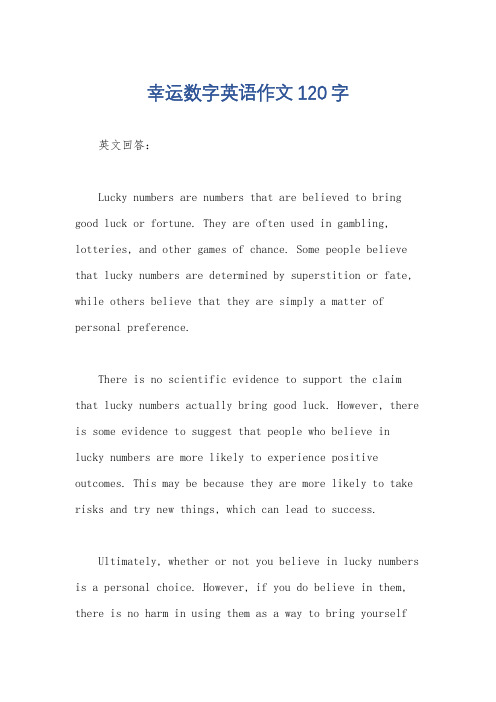
幸运数字英语作文120字英文回答:Lucky numbers are numbers that are believed to bring good luck or fortune. They are often used in gambling, lotteries, and other games of chance. Some people believe that lucky numbers are determined by superstition or fate, while others believe that they are simply a matter of personal preference.There is no scientific evidence to support the claim that lucky numbers actually bring good luck. However, there is some evidence to suggest that people who believe in lucky numbers are more likely to experience positive outcomes. This may be because they are more likely to take risks and try new things, which can lead to success.Ultimately, whether or not you believe in lucky numbers is a personal choice. However, if you do believe in them, there is no harm in using them as a way to bring yourselfsome extra good luck.Here are some examples of lucky numbers from different cultures:In China, the number 8 is considered to be lucky because it sounds like the word for "prosperity."In Japan, the number 7 is considered to be lucky because it is associated with the seven lucky gods of fortune.In the United States, the number 13 is considered to be unlucky, but in many other cultures it is considered to be lucky.中文回答:幸运数字是人们相信会带来好运或财富的数字。
数字带来运气英语作文
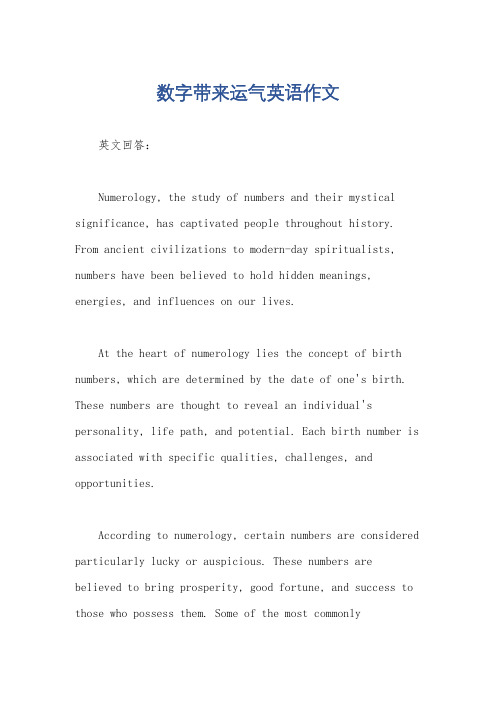
数字带来运气英语作文英文回答:Numerology, the study of numbers and their mystical significance, has captivated people throughout history. From ancient civilizations to modern-day spiritualists, numbers have been believed to hold hidden meanings, energies, and influences on our lives.At the heart of numerology lies the concept of birth numbers, which are determined by the date of one's birth. These numbers are thought to reveal an individual's personality, life path, and potential. Each birth number is associated with specific qualities, challenges, and opportunities.According to numerology, certain numbers are considered particularly lucky or auspicious. These numbers are believed to bring prosperity, good fortune, and success to those who possess them. Some of the most commonlyassociated lucky numbers include:Number 7: The number seven is often associated with spiritual growth, enlightenment, and mystical abilities. It is said to bring wisdom, intuition, and a deep understanding of the world.Number 8: The number eight is often associated with material wealth, abundance, and financial success. It is believed to bring prosperity, stability, and a sense of accomplishment.Number 9: The number nine is often associated with humanitarianism, compassion, and universal love. It is believed to bring peace, harmony, and a sense of purpose to life.Number 11: The number eleven is often associated with intuition, creativity, and spiritual awareness. It is believed to bring inspiration, enlightenment, and a connection to higher realms.Number 22: The number twenty-two is often associated with master builders, visionaries, and architects of society. It is believed to bring leadership, innovation,and the ability to manifest great things.While the belief in lucky numbers is widespread, it is important to note that these numbers do not guarantee success or good fortune. Rather, they are considered symbolic representations of potential energies andqualities that individuals can cultivate within themselves.中文回答:数字带来运气。
幸运数字相关英语作文初三
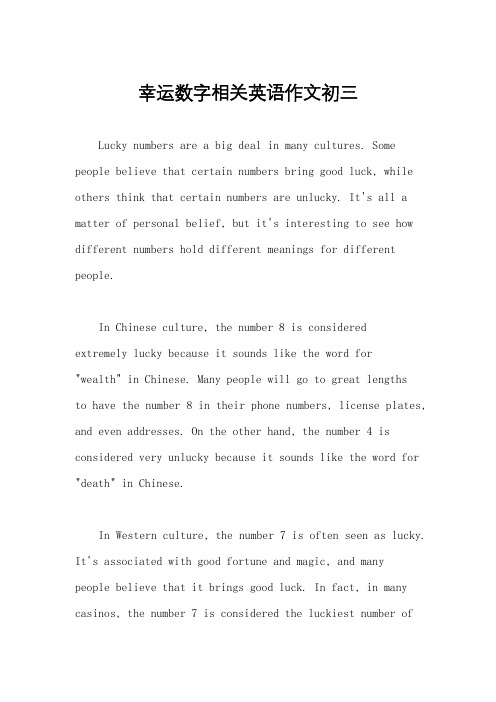
幸运数字相关英语作文初三Lucky numbers are a big deal in many cultures. Some people believe that certain numbers bring good luck, while others think that certain numbers are unlucky. It's all a matter of personal belief, but it's interesting to see how different numbers hold different meanings for different people.In Chinese culture, the number 8 is consideredextremely lucky because it sounds like the word for "wealth" in Chinese. Many people will go to great lengthsto have the number 8 in their phone numbers, license plates, and even addresses. On the other hand, the number 4 is considered very unlucky because it sounds like the word for "death" in Chinese.In Western culture, the number 7 is often seen as lucky. It's associated with good fortune and magic, and manypeople believe that it brings good luck. In fact, in many casinos, the number 7 is considered the luckiest number ofall. On the flip side, the number 13 is often seen as extremely unlucky in Western culture. Many buildings skip the 13th floor, and some people even have a fear of the number 13, known as triskaidekaphobia.In Japanese culture, the number 9 is considered lucky because it sounds like the word for "long-lasting" in Japanese. This is why the number 9 is often seen as a lucky number for weddings and celebrations. On the other hand, the number 4 is considered unlucky in Japanese culture because it sounds like the word for "death."In Indian culture, the number 3 is considered lucky because it's associated with the Hindu gods Brahma, Vishnu, and Shiva. Many people believe that the number 3 brings good luck and prosperity. On the other hand, the number 13 is considered extremely unlucky in Indian culture as well, and many people try to avoid it at all costs.Overall, lucky numbers are a fascinating aspect of different cultures around the world. Whether you believe inlucky numbers or not, it's interesting to see how different numbers hold different meanings for different people.。
幸运数字带来好运的好处和坏处英语作文
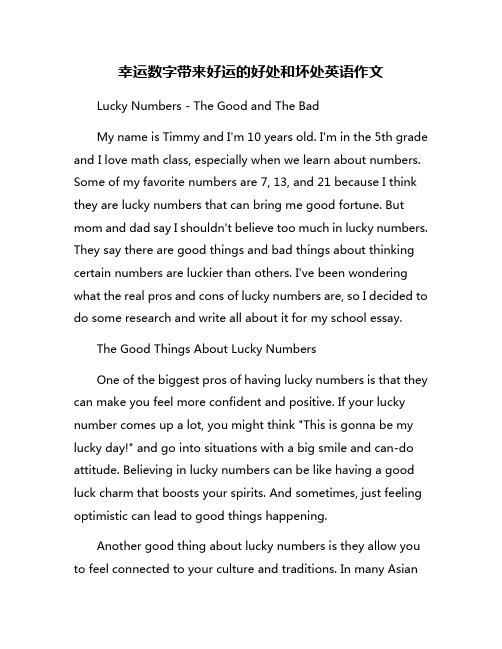
幸运数字带来好运的好处和坏处英语作文Lucky Numbers - The Good and The BadMy name is Timmy and I'm 10 years old. I'm in the 5th grade and I love math class, especially when we learn about numbers. Some of my favorite numbers are 7, 13, and 21 because I think they are lucky numbers that can bring me good fortune. But mom and dad say I shouldn't believe too much in lucky numbers. They say there are good things and bad things about thinking certain numbers are luckier than others. I've been wondering what the real pros and cons of lucky numbers are, so I decided to do some research and write all about it for my school essay.The Good Things About Lucky NumbersOne of the biggest pros of having lucky numbers is that they can make you feel more confident and positive. If your lucky number comes up a lot, you might think "This is gonna be my lucky day!" and go into situations with a big smile and can-do attitude. Believing in lucky numbers can be like having a good luck charm that boosts your spirits. And sometimes, just feeling optimistic can lead to good things happening.Another good thing about lucky numbers is they allow you to feel connected to your culture and traditions. In many Asiancountries like China, India, and Japan, certain numbers are considered very lucky based on ancient beliefs. For example, the number 8 is one of the luckiest numbers in Chinese culture because it sounds similar to the word for "prosperity." Having lucky numbers that are meaningful to your heritage can make you feel pride in where you came from.Lucky numbers can also just be fun! It's enjoyable to have little rituals and habits around lucky numbers, like always wearing your lucky number on your sports jersey or saving up dollar bills with your lucky digits. As a kid, finding little ways to weave lucky numbers into your life adds some whimsy and playfulness. It's an imaginative game that doesn't hurt anyone.Some people say having a lucky number has actually led to fortunate events happening in their lives, by pure coincidence or not. Maybe they got their dream job at a company with their lucky number as the address. Or they happened to win a radio contest where their lucky number was drawn. While it's hard to prove lucky numbers genuinely caused luck, as long as these stories boost happiness and hope, that's a good thing.The Bad Things About Lucky NumbersOn the flip side, one of the biggest cons of lucky numbers is that they aren't based on any concrete facts or evidence. Thereisn't any science proving that certain numbers are actually luckier than others. Numbers are just Arabic numerals without any magical properties. Believing too strongly in the superpowers of lucky digits goes against logic and reason.Taken to an extreme, lucky number obsessions can become problematic. Some people won't go to addresses or fly on airplanes with their "unlucky" numbers, limiting their life experiences. Or they might make poor purchases like overpaying for a used car just because it has their lucky number as the license plate number. In severe cases, lucky number mania can fuel OCD tendencies and anxieties that negatively impact daily life.Another issue with lucky numbers is that different people and cultures view the same number as lucky or unlucky based on their beliefs. To someone from the West, the number 13 might be seen as unlucky and associated with bad omens. But in other cultures, 13 is considered a lucky, sacred number. When lucky numbers clash, it can create conflicts and misunderstandings between people.Finally, putting too much emphasis on lucky numbers can be a way to avoid taking responsibility for the results in your life. It's easy to blame your failures on not having your lucky numberaround, rather than your own lack of effort or skills. Successful people know that hard work, perseverance, and practice are much more important than any lucky charms. Relying too much on lucky numbers can become an excuse for mediocrity.My Thoughts On Lucky NumbersAfter looking at both the pros and cons, I've decided that lucky numbers can be harmless fun as a kid, but I don't want to become too superstitious and obsessive about them when I'm an adult. I like how my lucky numbers make me feel good and connect me to my Chinese-American heritage. Spotting those familiar digits puts a smile on my face.But I also agree with my parents that I shouldn't put too much stock in the actual "luck" of numbers. I need to focus on working hard, being a good person, and making good choices - those things will lead to real, lasting fortunate events in my life. Lucky numbers won't automatically make me pass my spelling tests or somehow magically let me win the big baseball game.I think the key is keeping a balanced perspective. Lucky numbers can be an enjoyable tradition and positive mental boost, but not something so deeply believed in that they control my important life decisions. As long as I remember that numbersare just numbers and not supernatural forces, then finding glimpses of 7 or 21 everywhere can stay lighthearted and lucky!。
幸运号码英文作文

幸运号码英文作文英文:Lucky numbers, what are they? For some people, they are just a combination of digits that bring them good luck. For others, they are a way to try to predict the future or win the lottery. Personally, I believe that lucky numbers are a bit of both. 。
When I was younger, I used to have a lucky number that I would always use when playing games or taking tests. It was 7, and I believed that it brought me good luck. Even now, I still find myself drawn to the number 7. But I also know that luck is not just about numbers. It's about attitude and mindset. 。
For example, if I go into a job interview with a positive attitude and a confident mindset, I am more likely to be successful. It's not just about the number on myshirt or the color of my tie. It's about how I presentmyself and how I approach the situation. 。
幸运数字英语作文
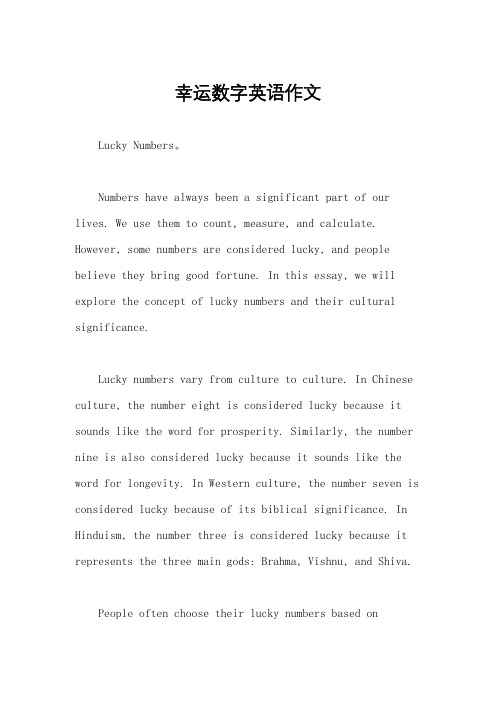
幸运数字英语作文Lucky Numbers。
Numbers have always been a significant part of our lives. We use them to count, measure, and calculate. However, some numbers are considered lucky, and people believe they bring good fortune. In this essay, we will explore the concept of lucky numbers and their cultural significance.Lucky numbers vary from culture to culture. In Chinese culture, the number eight is considered lucky because it sounds like the word for prosperity. Similarly, the number nine is also considered lucky because it sounds like the word for longevity. In Western culture, the number seven is considered lucky because of its biblical significance. In Hinduism, the number three is considered lucky because it represents the three main gods: Brahma, Vishnu, and Shiva.People often choose their lucky numbers based onpersonal experiences or beliefs. For example, someone may choose the number four as their lucky number because it was their birthdate, or they may choose the number thirteen because they believe it brings good luck. Some people even have multiple lucky numbers that they use for different purposes.Lucky numbers are not only used for personal reasons but also in various aspects of life. In sports, athletes often have a lucky number that they wear on their jerseyfor good luck. In business, some people choose to start their company on a specific date with a lucky number to ensure success. Lucky numbers are also used in gambling, where people believe that certain numbers will bring them good fortune.In conclusion, lucky numbers are an integral part of many cultures and beliefs. They represent hope, prosperity, and good fortune. Whether it is a personal belief or a cultural tradition, lucky numbers hold a special place in people's hearts and minds.。
幸运数字是什么英语作文
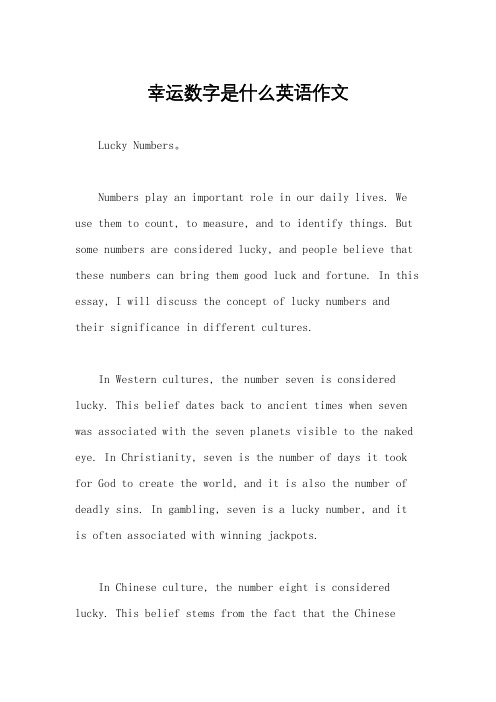
幸运数字是什么英语作文Lucky Numbers。
Numbers play an important role in our daily lives. We use them to count, to measure, and to identify things. But some numbers are considered lucky, and people believe that these numbers can bring them good luck and fortune. In this essay, I will discuss the concept of lucky numbers andtheir significance in different cultures.In Western cultures, the number seven is considered lucky. This belief dates back to ancient times when seven was associated with the seven planets visible to the naked eye. In Christianity, seven is the number of days it took for God to create the world, and it is also the number of deadly sins. In gambling, seven is a lucky number, and it is often associated with winning jackpots.In Chinese culture, the number eight is considered lucky. This belief stems from the fact that the Chineseword for eight sounds like the word for prosperity. People often choose phone numbers, license plates, and even wedding dates that contain the number eight. In fact, during the Beijing Olympics, the opening ceremony began at 8:08 pm on August 8th, 2008.In Indian culture, the number nine is considered lucky. This belief is based on the fact that nine is the highest single-digit number, and it represents completeness and perfection. In Hinduism, there are nine planets, and Navratri, a nine-day festival, is celebrated in honor of the goddess Durga. In numerology, the number nine is associated with creativity and spirituality.In addition to these cultures, there are many others that have their own lucky numbers. For example, in Japanese culture, the number four is considered unlucky because it sounds like the word for death. In Korean culture, the number three is considered lucky because it represents harmony and balance.In conclusion, lucky numbers are an important part ofmany cultures. People believe that these numbers can bring them good luck and fortune, and they often use them to make important decisions in their lives. Whether it is the number seven, eight, nine, or any other number, the concept of lucky numbers is a fascinating one that continues to intrigue people around the world.。
数字带来好运英语作文
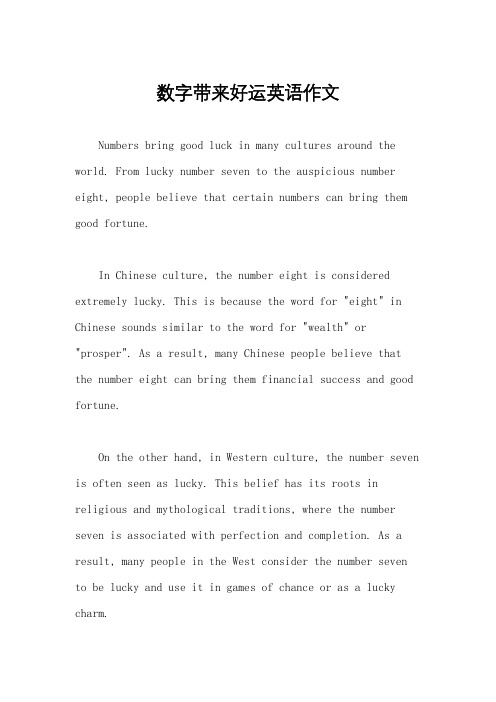
数字带来好运英语作文Numbers bring good luck in many cultures around the world. From lucky number seven to the auspicious number eight, people believe that certain numbers can bring them good fortune.In Chinese culture, the number eight is considered extremely lucky. This is because the word for "eight" in Chinese sounds similar to the word for "wealth" or "prosper". As a result, many Chinese people believe that the number eight can bring them financial success and good fortune.On the other hand, in Western culture, the number seven is often seen as lucky. This belief has its roots in religious and mythological traditions, where the number seven is associated with perfection and completion. As a result, many people in the West consider the number seven to be lucky and use it in games of chance or as a lucky charm.In many cultures, the number four is considered unlucky. This is because the word for "four" sounds similar to the word for "death" in many East Asian languages. As a result, people often avoid using the number four or anythingrelated to it, such as room numbers or phone numbers.In conclusion, the belief in lucky numbers is a fascinating aspect of human culture. Whether it's the number eight in Chinese culture or the number seven in Western culture, people around the world believe thatcertain numbers can bring them good luck and fortune.。
幸运数字 英文作文
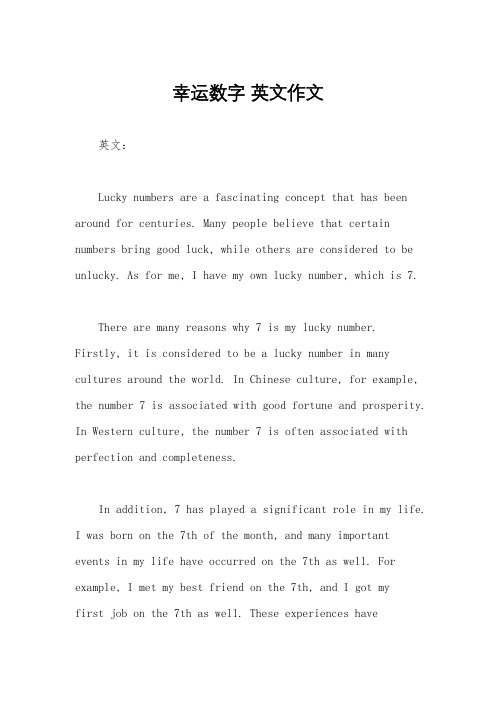
幸运数字英文作文英文:Lucky numbers are a fascinating concept that has been around for centuries. Many people believe that certain numbers bring good luck, while others are considered to be unlucky. As for me, I have my own lucky number, which is 7.There are many reasons why 7 is my lucky number.Firstly, it is considered to be a lucky number in many cultures around the world. In Chinese culture, for example, the number 7 is associated with good fortune and prosperity. In Western culture, the number 7 is often associated with perfection and completeness.In addition, 7 has played a significant role in my life.I was born on the 7th of the month, and many important events in my life have occurred on the 7th as well. For example, I met my best friend on the 7th, and I got myfirst job on the 7th as well. These experiences havereinforced my belief that 7 is a lucky number for me.Of course, not everyone believes in lucky numbers, and some people may find the concept to be superstitious or irrational. However, for me, having a lucky number is a fun and harmless way to bring a little extra positivity into my life.中文:幸运数字是一个迷人的概念,已经存在了几个世纪。
- 1、下载文档前请自行甄别文档内容的完整性,平台不提供额外的编辑、内容补充、找答案等附加服务。
- 2、"仅部分预览"的文档,不可在线预览部分如存在完整性等问题,可反馈申请退款(可完整预览的文档不适用该条件!)。
- 3、如文档侵犯您的权益,请联系客服反馈,我们会尽快为您处理(人工客服工作时间:9:00-18:30)。
初中英语作文:幸运数字 Lucky Numbers
Part Ⅴ : Writing : Lucky Numbers (30 points)
最近几年,一直流行幸运花、幸运石、幸运数字等说法,即有些东西与人的命运联系在一起,如果掌握住了,就会使自己生活幸福,你对这种现象有何看法?
要求:①题目:自拟。
②叙述要有条理,观点明确,翻译题目提示不得分。
③词数120词左右。
the lucky-number has become increasingly popular in daily life of mordern socialty. For example, the number eight means big money which people like most, while the number four means death. Some people believe lucky numbers so deeply that they will afford a telephone with numbers without four and others which is bad in their mind. they argue that the lucky-number really can bring good luck, and, at least, no evidence testify they can not.
As far as I am concerned, there is no such relationship betwwen the numbers and lucky, for the reason that numbers theirself are given certain meaning for the purpose of application of mathmetic. And, In addition, man should not depend on lucky which, in their mind, the numbers gives them.。
